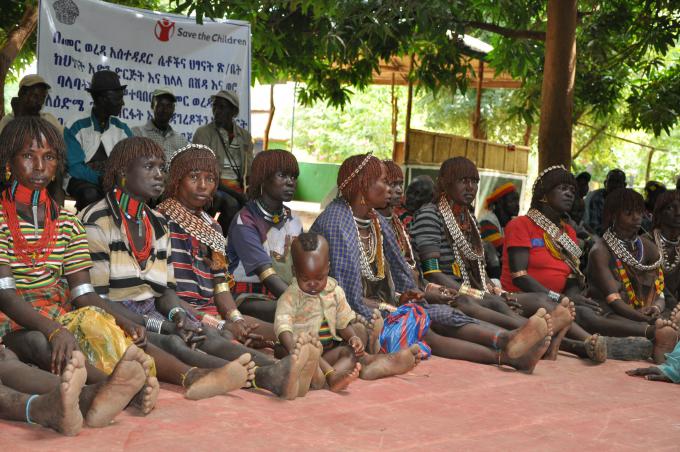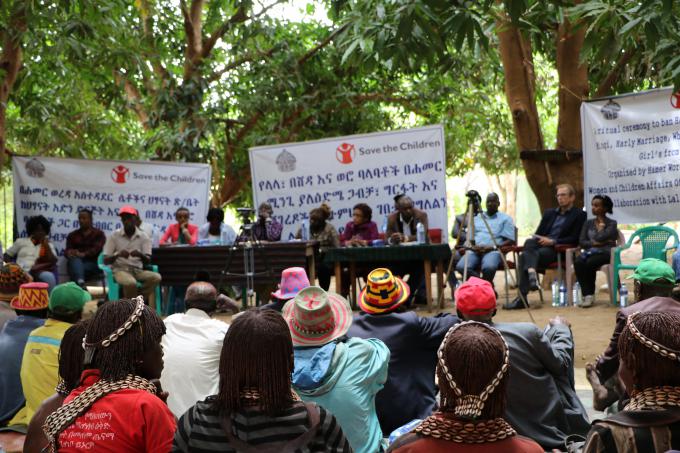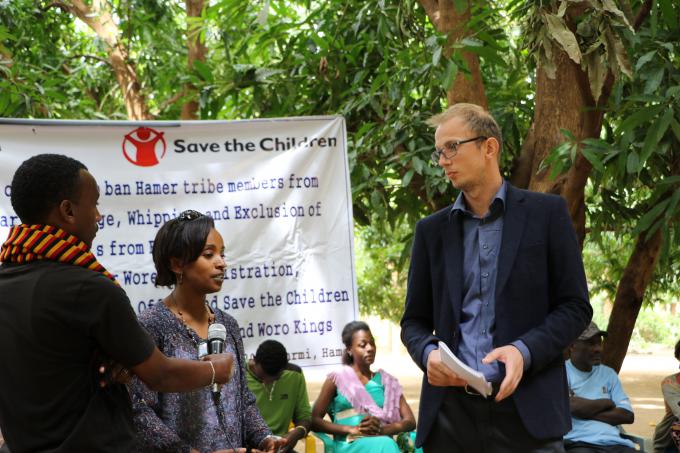The Hamer community says "We no longer tolerate violence against children"
On 24 June 2016, members of the Hamer community were gathered, along with three of their clan leaders, to declare their commitment to abandon the harmful traditional practices named; ‘Mingi’ (ritual killing), child marriage, exclusion of girls from education and whipping of women during bull-jumping ceremony. The date marked a ritualistic ceremony organized in accordance with the community culture. The local/regional government with support from Save the Children organized the event.
The lower valley of Omo, adjacent to the Omo and Waito River in Southwestern Ethiopia close 656km from the capital Addis Ababa, is where the Hamer people reside. The local dialect falls within the South Omotic language group. The local environment is part of the ‘lowlands’ of Ethiopia which receives unreliable and scarce rainfall. The local economy is built upon pastoralism, local honey production, and primitive hunter gather livelihoods. The Hamer tribe customs are based around local beliefs that define social interaction and engagement. The egalitarian society expresses historical social events through the use of dramas, play and storytelling. The Hamer people believe in Barjo, the wellbeing, good fortune, creative power and fate as well as Maeshi the ancestral spirit which influences everyday life.
As per the tradition, a newly married woman must complete rituals before she becomes pregnant. If not, the conceived child will be considered a Mingi, impure and cursed. In addition, the community believes; if a child grows its upper incisors, either milk or second set of teeth, before its lower incisors, and chipped a baby tooth, that child is impure. A Mingi child is not accepted into Hamer society and must be aborted or killed postpartum. They believe its presence in the society will provoke the ancestors’ spirit, the Maeshi, to bring curse and catastrophe.
The traditional bull jumping is a rite of passage for men coming of age. The man must jump over a line of 10 to 30 bulls four times completely nude without falling, to have the blessing from tribal leaders for his engagement for marriage. During this ceremony, men from his extended family provide cattle to support the newly engaged man. And the women of the tribe provoke the young men to whip them on their bare backs, which is how women express their happiness for the engagement of the man since they do not own property or cattle to provide him. This is extremely painful and causes severe scarring on women.
Save the Children, in collaboration with the Women and Children Affairs offices and other stakeholders, has been advocating for the abandonment of such harmful traditional practices among the Hamer, Dassenech and Gnanagatom communities in South Omo Zone since 2010. In 2015, Save the Children, through funding from Save the Children Italy, revised its strategies with the objective of strengthening community and government capacity to prevent and respond to harmful traditional practices. This was done through programs aimed at increasing access to health, education and protection services for at risk and survivor children and mothers.
As part of this initiative, Save the Children, in collaboration with the regional government, organized a ritual ceremony to ban the practices of Mingi and Whipping as well as failure to send girls to school for fear of “losing them”. The ceremony, which was led by three clan leaders in the area, involved representatives of the Hamer community and other elders.
“Today is a celebration for the Community, the Government and Save the Children as we have achieved a lot through cooperation for Education and Child Protection.” Said Mr. Onno van Manen, Deputy County Director of Save the Children in Ethiopia; as he addressed members of the community gathered at the ritual. “This event is in line with the Save the Children’s goals for 2030 which are: No child dies from preventable causes, all children get quality basic education and Violence against children is no longer tolerated. We believe we can achieve this through our cooperation for the children of this region.”
Mrs. Atsede Ayeza, Deputy Head for Women, Youth and Children Affairs of Southern Peoples Nations and Nationalities Region, recognized the contribution of Save the Children during her speech on the event. “Women have an important role in any community as they are mothers and wives. If we give appropriate recognition, women can lead a community to development. I would like to thank Save the Children and other partners who are working with the government to eliminate this problem.”
“The harmful traditional practices have been the root causes of problems on social, psychological and human rights issues.” says Mr. Alemayehu Baweda, Governor of South Omo Zone. He also added, “The government has done a lot with stockholders and partners to reduce the problem but due to issues related to community awareness, expected results are not achieved in the community. In order to get good results, the decisions made by elders and the community on this event and other pervious community discussions need follow up”.
Save the Children, working with mandated government offices and community structures, will follow and cascade the decision made by the clan leaders down to Kebele level (Lowest Administrative Units) and work to ensure that Kebele level leaders disseminate and translate the law to prevent and protect children from Harmful Traditional Practices. Save the Children will also continue support to affected children and families to integrate them back in to the community.
 Ethiopia
Ethiopia 

